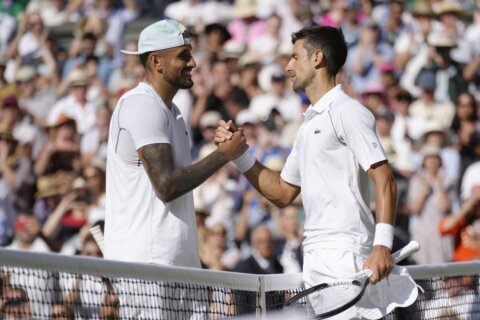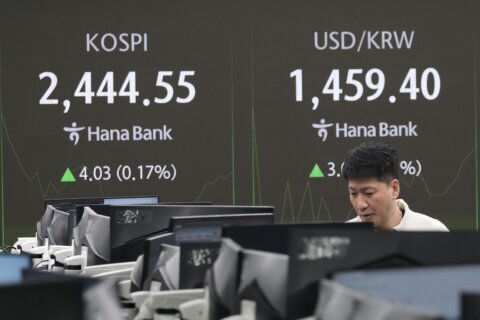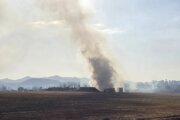BRISBANE, Australia (AP) — A scoreless draw on either side of an upset win over co-host Australia has Nigeria coach Randy Waldrum and his Super Falcons feeling like they’ve beaten the odds at the Women’s World Cup.
After securing a spot in the round of 16 with an unlikely second-place finish in Group B, the No. 40-ranked Nigeria squad is ready for anything.
“When I first saw the group, it was like ‘oh my gosh, this is such a difficult group,’” Waldrum recalled of the bracket containing Olympic champion Canada, tournament co-host Australia and Ireland, a team determined to make its mark on debut.
Apart from a vast rankings disparity, Nigeria was also dealing with a pay dispute between the players and the national federation. The squad’s preparation for the tournament was curtailed because of a lack of resources and support, and Waldrum came under heavy criticism for calling it out.
Waldrum said this is a common struggle for many countries of the so-called Global South compared with the well-resourced national teams which enter the tournament much more prepared.
“We still have an upper echelon with teams that have all the resource,” Waldrum said. “And then you have other teams that don’t have quite as much.”
Despite the difficult circumstances, t he Super Falcons began the tournament with a 0-0 draw against seventh-ranked Canada. That result suggested Nigeria wouldn’t be a pushover. Then came the surprising 3-2 win over 10th-ranked Australia, which had only lost one of its previous 11 games.
That win put Nigeria on the verge of qualifying for the round of 16, while also sending Australia into a must-win game against Canada.
A 0-0 draw against Ireland on Monday night was enough for the team to advance behind Australia, which closed the group stage with a thumping 4-0 win over Canada. It also meant that Nigeria went through the group stage without a loss for the first time.
“I always felt like we had the talent to do it,” Waldrum said. “My biggest thing as the coach of this team was: ‘Do I have enough time to do it?’”
The ongoing dispute between the team and its federation resulted in the Super Falcons having less time to prepare for the tournament than Waldrum would have liked.
“We’ve done all of this with 15 practices,” Waldrum said. “I wouldn’t have dreamt that we could do that well, but I think it’s largely due that there’s talent here.”
This talent includes attacking stars like Barcelona’s Asisat Oshoala and Atletico Madrid’s Rasheedat Ajibade, but also extends to an unheralded group of defenders who held two teams scoreless.
“We have really good attacking players but defensively we pride ourselves on throwing our body in front of things,” said Ashleigh Plumptre, a University of Southern California alumna.
The Super Falcons have caught the attention of the world not only with their performance, but also with the spirit they show. The smiles, singing, dancing on the way into the stadium and on-field prayers all showcase a culture that is ingrained in the squad.
“I find the most fulfilling part of being on this team is that I genuinely feel like I’m a part of something bigger,” Plumptre said. “It’s hard to put into words to be honest, but I’ve cried every time when we’re dancing and singing into the stadium. I get really overwhelmed by it because it feels culturally so powerful.”
With group play now behind them, the Super Falcons prepare to return to Brisbane next Monday to play the winner of Group D, which many expect to be England.
As was the case in group play, the Super Falcons won’t be favored.
“Why not play England?” Waldrum said. “We’ve played the Olympic gold medalists. We’ve played Australia, the host nation. Bring on the European champions. Why not?”
___
Brooke Evans is a student at the University of Georgia’s Carmical Sports Media Institute.
___
AP Women’s World Cup coverage: https://apnews.com/hub/fifa-womens-world-cup and https://twitter.com/AP_Sports
Copyright © 2024 The Associated Press. All rights reserved. This material may not be published, broadcast, written or redistributed.







